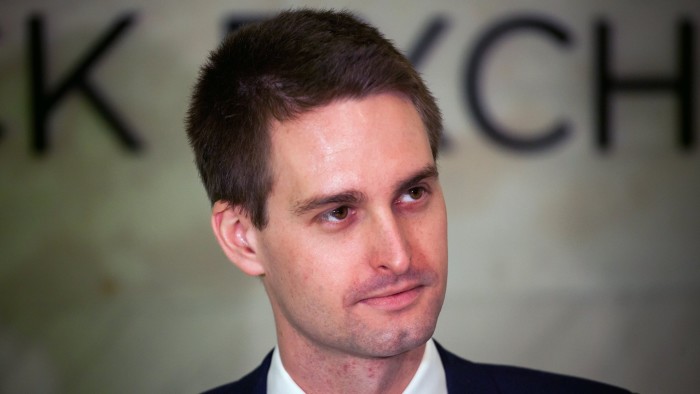Millennials are less entrepreneurial and fail more often

Simply sign up to the US & Canadian companies myFT Digest -- delivered directly to your inbox.
Noah Kraft was a charismatic twenty-something when he set up Doppler Labs, a business with a mission to build a “computer for the ears”.
It was a commercial enterprise with a social purpose: to improve life for the hard of hearing. It reportedly raised $50m in venture capital funding for its flagship product, the HereOne — smart earbuds that were a kind of souped-up version of Apple’s AirPods.
Mr Kraft, and other high-profile millennial company founders, such as Mark Zuckerberg at Facebook, Evan Spiegel at Snapchat and Alexis Ohanian at Reddit, appear to be proof of their generation’s ambition and start-up spirit. In fact, they are atypical. Millennials — people born between 1981 and 1996, as the Pew Research Center defines the generation — are actually not very entrepreneurial.
Millennials came of age during the era of The Apprentice and Dragons Den — TV shows in which business people vie for success or funding. However, fewer of them are setting up their own businesses than their predecessors who reached adulthood during the economic turbulence of the 1970s or the resurgent capitalism of the 1980s and 1990s. A study of 2014 data by the US Small Business Administration found fewer than 4 per cent of 30-year-olds reported they were in full-time self-employment — a proxy for entrepreneurship — compared with 5.4 per cent of Generation X-ers (the previous generation) and 6.7 per cent of Baby Boomers (defined as those born between 1944 and 1962) at the same age.
Part of the downturn in the number of start-ups run by younger founders might be due to an aversion to risk. While the shrinking pool of traditional graduate jobs available with the advent of the 2008 recession might have been expected to spur the creation of alternative opportunities outside the triumvirate of banking, consultancy and law, US Census Bureau statistics show the start-up creation rate actually dropped sharply and has yet to recover to pre-crisis levels.
Ana Bakshi, who heads the new Oxford Foundry project, a hub programme at Oxford university backed by the LinkedIn founder Reid Hoffman, says “overcoming fear of failure tops the list” of requests for help from would-be entrepreneurs. “Millennials do suffer from a lack of confidence,” she says. “It’s not an easy thing starting and building a business.”
When millennials do, they set up a lot of them. Entrepreneurs aged between 20 and 35 had on average already set up twice as many businesses as those over 50, a 2015 report from BNP Paribas found.
Having a string of start-ups to your name before the age of 35 does not necessarily mean those businesses survive, however. Aged 30, Rory Bate-Williams has got three enterprises off the ground. Of those, the first — a business renting out medieval-style tents founded in his teenage years — is still trading, but under the direction of a family member. The second, Boink, a messaging platform, is no more. His third effort, a Cajun-style grilled chicken street food business called Voodoo Chicken, is in its early days.
Mr Kraft’s early success also fizzled out. After four years, Doppler Labs folded. The HereOne dramatically undersold expectations, and Mr Kraft, who did not reply to requests for an interview for this article, found himself unable to raise the funds to continue.
Mr Kraft’s and Bate-Williams’ chequered record of success is reflected in official data. The younger generation of founders is far less likely to be successful compared with their older peers: the peak age for a founder is 45 with those in their 20s least likely to create a high-growth firm, according to a study again using US Census Bureau data. In the UK, official data show that almost as many companies stop trading each year as start.
Plenty of millennials say they would like to be their own boss, but far fewer take the plunge. Although there is far more support available in the form of incubators and cultural acceptance — and recognition — of entrepreneurs: “there is still a gap between the ambition the [millennial] generation actually has and those that go on to start a business,” says Robert Osborne of the Centre for Entrepreneurs, a think-tank in London. “There is always going to be a sense of unease and uncertainty that comes with a lack of world experience.” On top of that, previous generations were not burdened with quite the same level of student debt, he points out.
The millennial generation is not necessarily homogenous in its entrepreneurial reluctance, though. There is some evidence the younger members of the group — those who graduated well after the end of the financial crisis — are more willing than their older peers to risk failure.

Oxford university careers service data show almost 15 per cent of incoming students reported an interest in becoming entrepreneurs in October 2016; a year later, the figure had risen to 19 per cent. “There’s a marked increase — a significant difference between age groups,” Mr Osborne says.
The change in attitude has also been noticed by Emma-Jane Packe, managing director of the Supper Club, a networking group for scale-up businesses that have hit certain revenue targets. “Before people may have started companies in their late 20s but were not getting to scale until their late 30s. In the past 18 months we’ve had lots of young millennials — around 20 to 25,” she says. That could be because younger entrepreneurs are scaling up their businesses quicker, Ms Packe says.
It could also be because they are more accepting of failure. “The upper end of the age group — they’re less willing to give it a try.” The younger ones: “they’re more willing to give it a go, see how it goes — and fail.”
Comments